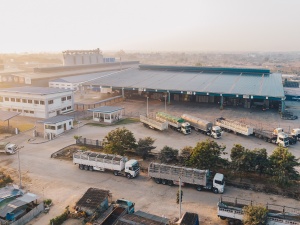More investment expected within industrial property
Many investment funds and industrial real estate developers are taking advantage of mergers and acquisitions (M&As) to enter the market. How do you view such deals in the industrial property segment?
 |
| Marco Forster, head of ASEAN Advisory at Dezan Shira & Associates |
The past year has indeed seen a significant uptick in M&A in the industrial real estate sector, closely tied to the influx of foreign direct investment (FDI). This trend reflects a strategic shift by many investors and developers to consolidate their market presence rapidly.
The increasing FDI has acted as a catalyst, as international companies seek local partners and properties to establish or expand their operations, especially in regions with burgeoning industrial activities.
The M&A approach offers several advantages, such as immediate access to established assets, local market insights, and existing operational frameworks. It bypasses many of the hurdles associated with greenfield investments, such as lengthy approvals, land acquisition issues, and infrastructure development.
We anticipate this trend to continue, potentially at an even more accelerated pace. The ongoing global economic realignment, with a focus on supply chain diversification and resilience, will likely drive more FDI into diverse markets.
Consequently, M&A in industrial real estate could become a primary strategy for entities looking to capitalise on these shifts. However, this will also increase competition, potentially driving up asset values and making market entry more challenging.
What are the criteria for selecting businesses and projects before a deal?
When selecting businesses and projects for an M&A in the sector, we typically assist investors regarding several key criteria.
Financial health is paramount; this includes a thorough analysis of the target’s financial stability, profitability, balance sheets, cash flow statements, and future revenue projections. Equally important is the assessment of market position and potential, where the market share, reputation, and growth potential of the target are evaluated, along with broader market trends.
The quality of physical assets, such as the condition and location of real estate, infrastructure quality, and compliance with regulations, is also critically examined. Legal, human resources, tax, and regulatory due diligence are other major areas to look at, in ensuring adherence to local laws, land use rights, environmental standards, and construction norms.
Synergy potential is also considered, although we observe this on a minor scale in Vietnam, to determine how well the target’s operations, culture, and strategy align with the acquiring company’s objectives and whether the merger can create added value.
Finally, a comprehensive risk assessment, including market risks, potential regulatory changes, and environmental concerns, is crucial for a successful decision. These criteria collectively inform the decision-making process, aiming to ensure that the M&A not only aligns with the investor’s strategic goals but also promises sustainable growth and value addition.
Some say the foreign appetite for industrial real estate has grown as Vietnamese enterprises are selling at lower prices. What is your view?
The view that foreign investors are easing their criteria in response to attractive pricing from Vietnamese companies requires a more layered interpretation. The perception among buyers of a deal as “too good to be true” could actually invoke more scepticism than reassurance.
While it’s generally true that cost-effective opportunities might attract more interest, especially in a competitive market like Vietnam, it’s unlikely that serious investors would compromise on due diligence or strategic fit.
Foreign investors often bring a rigorous assessment framework to M&As, focusing on long-term value creation rather than just initial cost savings. Even if Vietnamese enterprises offer attractive pricing, the decisions to proceed with M&As will still likely be contingent on the broader strategic fit and potential for sustainable growth. Moreover, investors must also consider the macroeconomic environment, regulatory landscape, and geopolitical factors that could influence the success of their investment.
While attractive pricing can be a factor in M&A decisions, it’s typically not the sole determinant, especially for seasoned investors who prioritise strategic alignment and long-term returns.
 | Industrial real estate witnesses robust growth in Q3 Vietnam's industrial real estate sector has shown remarkable signs of growth in the third quarter of 2023, with substantial new project launches contributing significantly to the market. |
What the stars mean:
★ Poor ★ ★ Promising ★★★ Good ★★★★ Very good ★★★★★ Exceptional
Related Contents
Latest News
More News
- Construction firms poised for growth on public investment and capital market support (February 11, 2026 | 11:38)
- Mitsubishi acquires Thuan An 1 residential development from PDR (February 09, 2026 | 08:00)
- Frasers Property and GELEX Infrastructure propose new joint venture (February 07, 2026 | 15:00)
- Sun Group led consortium selected as investor for new urban area (February 06, 2026 | 15:20)
- Vietnam breaks into Top 10 countries and regions for LEED outside the US (February 05, 2026 | 17:56)
- Fairmont opens first Vietnam property in Hanoi (February 04, 2026 | 16:09)
- Real estate investment trusts pivotal for long-term success (February 02, 2026 | 11:09)
- Dong Nai experiences shifting expectations and new industrial cycle (January 28, 2026 | 09:00)
- An Phat 5 Industrial Park targets ESG-driven investors in Hai Phong (January 26, 2026 | 08:30)
- Decree opens incentives for green urban development (January 24, 2026 | 11:18)

 Tag:
Tag:




















 Mobile Version
Mobile Version